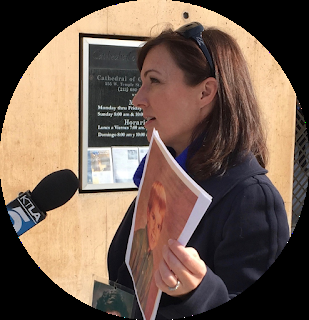 Joelle Casteix has written the clearest, most informed response I've yet seen regarding the allegations of Viganò and his followers about the sexual abuse horror show in the Catholic church. Her essay, "'It’s a Gay Problem,' and Other Myths From the Catholic Church's Sexual Abuse Crisis," is at Religion Dispatches this morning. An excerpt:
Joelle Casteix has written the clearest, most informed response I've yet seen regarding the allegations of Viganò and his followers about the sexual abuse horror show in the Catholic church. Her essay, "'It’s a Gay Problem,' and Other Myths From the Catholic Church's Sexual Abuse Crisis," is at Religion Dispatches this morning. An excerpt:By muddying the waters and shifting focus from the crimes and onto politics and the Vatican culture war, Vigano’s letter feeds into old stereotypes that silence victims, minimize abuse, and encourage the continued cover-up.
If we want to address the scope and scale of the problem and put an end to the crisis and those who enable it, we must first work to dispel the myths and stereotypes that aim to silence victims and normalize criminal sexual behavior.
A problem of "homosexual priests"
This is a complicated issue, though it's not a murky one. It's important to begin by noting that, according to experts, there is absolutely zero evidence that sexual orientation has anything to do with sexual abuse. Period. In fact, when it comes to adult men who sexually abuse boys, researchers have found that it doesn't even make sense to label these men as "homosexual," since they neither possess an adult sexual orientation nor do they tend to show a preference for gender.
When apologists cite "the gay problem" for the ongoing crisis—what Bishop Robert Molino recently called the "homosexual subculture"—their intention is to paint a picture of secretive and "deviant" groups of clergy and a wider Church culture that tolerates them. In reality, the allegedly disproportionately large number of gay priests may be related to the problem, but it isn't the cause of it.
As Robert Mickens wrote in July, and as others have noted for years, the pathologizing of queer sexualities has driven many men to the priesthood, as the vow of celibacy offers what appears to be a safe haven from negotiating a forbidden path. As a result, although he’s careful to point out that there is nothing about gay men in healthy situations that makes them more apt to sexually abuse others, Mickens argues that some of the abuse is due to the "homophobia that keeps gay men in the closet, bars them from growing up and results in distorted sexuality for many gay priests."
In other words, the "homosexual subculture" isn't the problem, though the demonization of queer sexualities could certainly contribute to the failure to develop a healthy adult sexuality.
Ask any victim of clergy sexual abuse—male or female—and they will tell you: child sexual abuse has no place in healthy adult sexuality, gay or straight. When apologists call the crisis a "gay problem," they succeed in both silencing women victims and forcing a sexual identity onto male victims against their will.
We don't know the sheer number of female victims of child sexual assault in the Catholic Church. But women are not victims of gay priests. So what does this make the women? Are they not victims at all? Such explanations leave little room for female victims who are then more likely to stay silent and minimize their experiences.
Now let's talk about the male victims. Want the easiest way to silence and shame a male (straight or gay) victim of child rape and sanitize the crime? Call the crime "gay sex." Make him question whether the abuse was an actual crime at all.
Child sex abuse is a crime of violence where those in positions of power prey upon the weak and vulnerable, using sex as a weapon. Apologists for the Catholic Church will do anything to make sure that this isn't the focus.
And while I'm featuring this valuable essay by Joelle Casteix this morning, let me also note the new survivor advocates' group that Joelle and others have recently formed. It's called Survivors Taking on Predators — STOP. Information about the group with a link to join it is at Joelle's Worthy Adversary blog site.
The photo of Joelle Casteix is from her Worthy Adversary blog.

